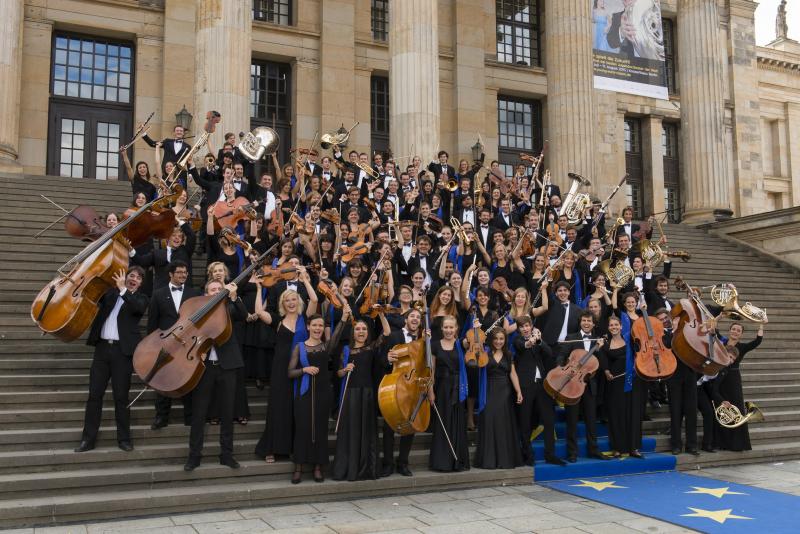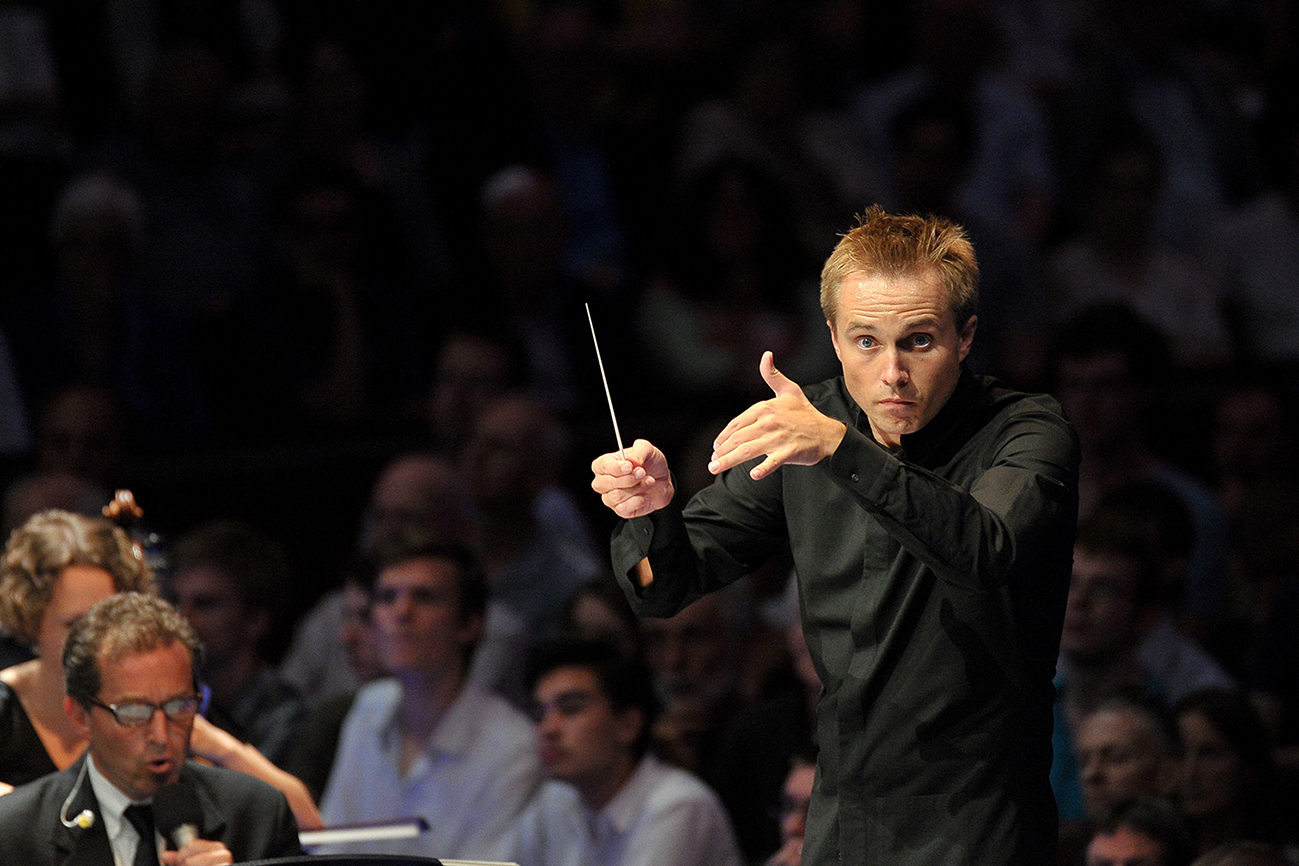Prom 26: European Union Youth Orchestra, London Voices, Petrenko | reviews, news & interviews
Prom 26: European Union Youth Orchestra, London Voices, Petrenko
Prom 26: European Union Youth Orchestra, London Voices, Petrenko
A youth orchestra teaches musical history in an astonishingly mature performance

The symphony – that structural pillar of classical music – found itself under siege last night at the Proms. Both Berio’s Sinfonia and Shostakovich’s Fourth Symphony assault and subvert, reshape and reimagine the genre, puncturing the Victorian smugness of the Royal Albert Hall with doubt.
“And tomorrow we'll read that Shostakovich Four made tulips grow in my garden and altered the flow of the ocean currents. We must believe it's true. There must be something else. Otherwise it would be quite hopeless.” The self-reflexive, self-referential tricks of Berio’s Sinfonia are endless, an echo chamber in which it’s almost impossible to identify the original sound. Making explicit reference to “a composer and title of a work included in the same programme”, the composer plays his audience, tapping into every concert-goer’s anxiety and search for that elusive “something else” – something as potent now as when the work was commissioned in 1968.
EUYO captured not only the exuberance, but also the precision of Berio’s vision
Sinfonia is to classical music as TS Eliot’s The Waste Land is to literature. “These fragments I have shored against my ruins” – so Berio gathers together a jostling collage of musical moments and quotations, while inhabiting, parasite-like, the still-warm corpse of Mahler’s Second Symphony. It’s a witty and generous work, but one of considerable technical and conceptual challenges.
These were gamely tackled by the young musicians of the European Union Youth Orchesta, who, under Vasily Petrenko’s direction (standing in for the originally advertised Semyon Bychkov), captured not only the exuberance, but also the precision of Berio’s vision. The nightmarish waltz of Part III took focus out of the blurred, glassy textures of Part II, with piano and the leader’s solo violin emerging with particular clarity and swagger.
The EUYO were joined by the excellent London Voices, providing the eight solo singers whose mutters, shrieks, shouts and whispers mingled with the orchestral textures. Projecting drama into the far reaches of the hall, particular mention must go to the basses, who carry the narrative (such as it is) and succeeded in confronting us in multiple languages and projecting character over the weight of the orchestra.
 Withdrawn by the composer before its first performance and only subsequently premiered almost 30 years later, Shostakovich’s Fourth Symphony has a reputation that precedes its twisted difficulty and darkness. Controlling the work’s angular, richly unwieldy structure is a feat Petrenko (pictured above conducting the Berio. Photo: Chris Christodoulou ) has already demonstrated on his Liverpool Philharmonic recording, and one he repeated here – if anything with greater seriousness of purpose.
Withdrawn by the composer before its first performance and only subsequently premiered almost 30 years later, Shostakovich’s Fourth Symphony has a reputation that precedes its twisted difficulty and darkness. Controlling the work’s angular, richly unwieldy structure is a feat Petrenko (pictured above conducting the Berio. Photo: Chris Christodoulou ) has already demonstrated on his Liverpool Philharmonic recording, and one he repeated here – if anything with greater seriousness of purpose.
If there’s a flaw with the Liverpool recording it’s a tendency to glibness – not a grinning, macabre Shostakovich-glibness, but just an ease that takes the edge off the music’s urgency. Here, marshalling young players whose seriousness is matched by their energy, Petrenko had only to flick a finger and the full force of an expanded wind and brass section would fling itself into battle.
The composer himself thought the symphony plagued by “grandiosomania”, but if ever there was a festival or a building to transform that into monumentality it’s the Proms and the Royal Albert Hall. Filling the space (without overwhelming it), the orchestra’s brass howled out the desperate protest of the opening, belying the delicacy the ensemble displayed in the intermezzo-like central movement that attempts a dance, but can’t quite raise the spirits or the energy to get it underway.
Mercurial in mood, the symphony stands or falls in the logic of progressions and oppositions, juxtapositions and transitions between sections. Petrenko’s scheme made sense of each, guiding us structurally while tightening the screw emotionally, never allowing a moment to pass that didn’t contribute to a larger narrative.
Orchestra concerts are always super-charged, the urgency of ambition and expression in the players magnified in their music. This one was no exception. These young players gave everything they had here: intellect to the Berio and heart to the Shostakovich. And in return they found that elusive “something else” that Berio hoped for and imagined.
rating
Share this article
Add comment
The future of Arts Journalism
You can stop theartsdesk.com closing!
We urgently need financing to survive. Our fundraising drive has thus far raised £49,000 but we need to reach £100,000 or we will be forced to close. Please contribute here: https://gofund.me/c3f6033d
And if you can forward this information to anyone who might assist, we’d be grateful.

Subscribe to theartsdesk.com
Thank you for continuing to read our work on theartsdesk.com. For unlimited access to every article in its entirety, including our archive of more than 15,000 pieces, we're asking for £5 per month or £40 per year. We feel it's a very good deal, and hope you do too.
To take a subscription now simply click here.
And if you're looking for that extra gift for a friend or family member, why not treat them to a theartsdesk.com gift subscription?
more Classical music
 Bizet in 150th anniversary year: rich and rare French offerings from Palazzetto Bru Zane
Specialists in French romantic music unveil a treasure trove both live and on disc
Bizet in 150th anniversary year: rich and rare French offerings from Palazzetto Bru Zane
Specialists in French romantic music unveil a treasure trove both live and on disc
 Scottish Chamber Orchestra, Ibragimova, Queen’s Hall, Edinburgh review - rarities, novelties and drumrolls
A pity the SCO didn't pick a better showcase for a shining guest artist
Scottish Chamber Orchestra, Ibragimova, Queen’s Hall, Edinburgh review - rarities, novelties and drumrolls
A pity the SCO didn't pick a better showcase for a shining guest artist
 Kilsby, Parkes, Sinfonia of London, Wilson, Barbican review - string things zing and sing in expert hands
British masterpieces for strings plus other-worldly tenor and horn - and a muscular rarity
Kilsby, Parkes, Sinfonia of London, Wilson, Barbican review - string things zing and sing in expert hands
British masterpieces for strings plus other-worldly tenor and horn - and a muscular rarity
 From Historical to Hip-Hop, Classically Black Music Festival, Kings Place review - a cluster of impressive stars for the future
From quasi-Mozartian elegance to the gritty humour of a kitchen inspection
From Historical to Hip-Hop, Classically Black Music Festival, Kings Place review - a cluster of impressive stars for the future
From quasi-Mozartian elegance to the gritty humour of a kitchen inspection
 Shibe, LSO, Adès, Barbican review - gaudy and glorious new music alongside serene Sibelius
Adès’s passion makes persuasive case for the music he loves, both new and old
Shibe, LSO, Adès, Barbican review - gaudy and glorious new music alongside serene Sibelius
Adès’s passion makes persuasive case for the music he loves, both new and old
 Anja Mittermüller, Richard Fu, Wigmore Hall review - a glorious hall debut
The Austrian mezzo shines - at the age of 22
Anja Mittermüller, Richard Fu, Wigmore Hall review - a glorious hall debut
The Austrian mezzo shines - at the age of 22
 First Person: clarinettist Oliver Pashley on the new horizons of The Hermes Experiment's latest album
Compositions by members of this unusual quartet feature for the first time
First Person: clarinettist Oliver Pashley on the new horizons of The Hermes Experiment's latest album
Compositions by members of this unusual quartet feature for the first time
 Gesualdo Passione, Les Arts Florissants, Amala Dior Company, Barbican review - inspired collaboration excavates the music's humanity
At times it was like watching an anarchic religious procession
Gesualdo Passione, Les Arts Florissants, Amala Dior Company, Barbican review - inspired collaboration excavates the music's humanity
At times it was like watching an anarchic religious procession
 Classical CDs: Camels, concrete and cabaret
An influential American composer's 90th birthday box, plus British piano concertos and a father-and-son duo
Classical CDs: Camels, concrete and cabaret
An influential American composer's 90th birthday box, plus British piano concertos and a father-and-son duo
 Cockerham, Manchester Camerata, Sheen, Martin Harris Centre, Manchester review - re-enacting the dawn of modernism
Two UK premieres added to three miniatures from a seminal event of January 1914
Cockerham, Manchester Camerata, Sheen, Martin Harris Centre, Manchester review - re-enacting the dawn of modernism
Two UK premieres added to three miniatures from a seminal event of January 1914
 Kempf, Brno Philharmonic, Davies, Bridgewater Hall, Manchester review - European tradition meets American jazz
Bouncing Czechs enjoy their Gershwin and Brubeck alongside Janáček and Dvořák
Kempf, Brno Philharmonic, Davies, Bridgewater Hall, Manchester review - European tradition meets American jazz
Bouncing Czechs enjoy their Gershwin and Brubeck alongside Janáček and Dvořák
 Solomon, OAE, Butt, QEH review - daft Biblical whitewashing with great choruses
Even a top soprano and mezzo can’t make this Handel paean wholly convincing
Solomon, OAE, Butt, QEH review - daft Biblical whitewashing with great choruses
Even a top soprano and mezzo can’t make this Handel paean wholly convincing

Comments
I agree with every word - the
I agree with every word - the concert itself was a neatly constructed tower out of the "Babel of hope and possibility" - and no, Alexandra and I didn't confer at any point. For me this, one of the best Proms I've ever attended, was so moving because here were a work from the 1960s which actually seemed to be saying that 'classical' music had splintered and collapsed, and one from the 1930s which ends with annihilation, and yet playing them were a collective beacon of optimism for the holding-together of a united Europe, astoundingly marshalled by an already great Russian conductor, a day after we commemorated its shattering in 1914.
So why on earth the BBC didn't film it for televising - ideal, a photogenic conductor, young attractive players, European flags around Sir Henry - beats me. Politics?
I found the last paragraph of
Terrific review, Alexandra.
Oh, and if the camera could
I know, Kerry - that warm
I know, Kerry - that warm embracing of each other after a job superlatively done, which we can also see with the players of the Lucerne Festival Orchestra, is a wonderful thing.
The BBC has some explaining to do as to why it passed on the screening of this one. True, it's televising the National Youth Orchestra's Prom, but why not both? Isn't this the best message to send out to the world about the future of music-making?